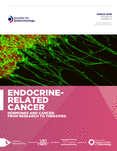Hormone receptor-positive early breast cancer: controversies in the use of adjuvant chemotherapy
- Divisione Universitaria di Oncologia Medica ed Ematologia, Istituto per la ricerca e la Cura del Cancro, 10060 Candiolo (Torino), Italy
- (Correspondence should be addressed to F Montemurro; Email: filippo.montemurro{at}ircc.it)
Abstract
Current adjuvant treatments for operable breast cancer include chemotherapy, endocrine therapy in hormone receptor-positive tumors, and trastuzumab for HER2-positive tumors. Metanalyses of randomized trials show that in patients with hormone receptor-positive breast cancer, the effects of endocrine therapy and chemotherapy on survival are non-mutually exclusive. Most of these patients are therefore considered candidates to combined treatment. Recently, however, the endocrine responsiveness of tumors has been redefined on clinical, histopathological, and molecular bases. An emerging concept is that as endocrine responsiveness increases, chemoresponsiveness decreases. In the adjuvant setting, therapeutic choices are often based on small projected improvements in clinical outcomes. As a consequence, the role of chemotherapy and traditional management algorithms in patients with hormone receptor positive is being challenged. This review will address the current controversy regarding the role of adjuvant chemotherapy, including the newer anthracycline and taxane-based programs, in these patients.
- © 2009 Society for Endocrinology












